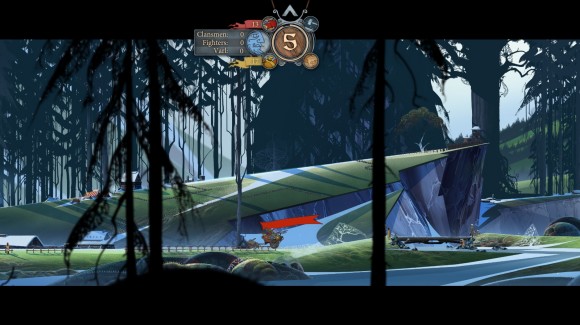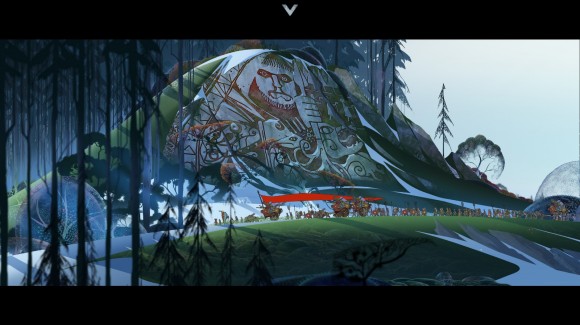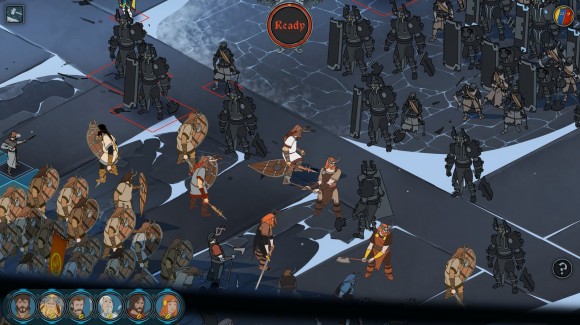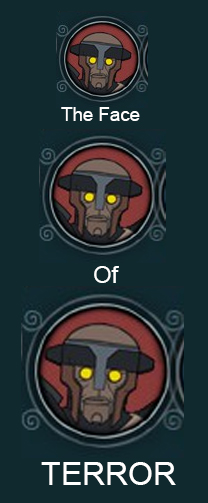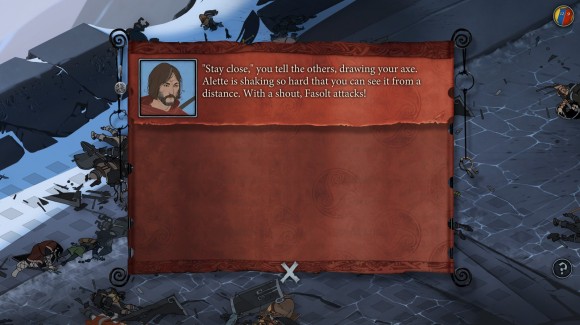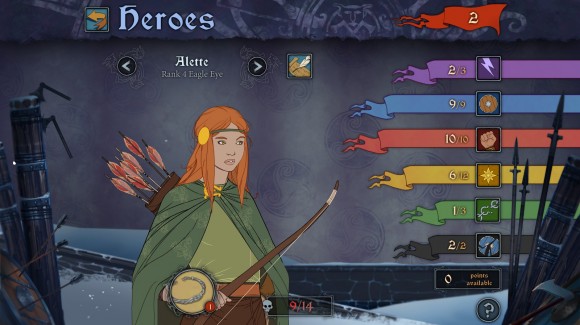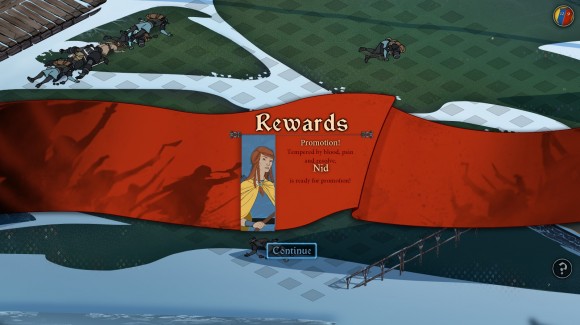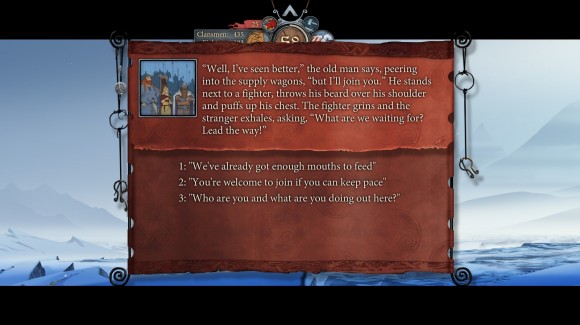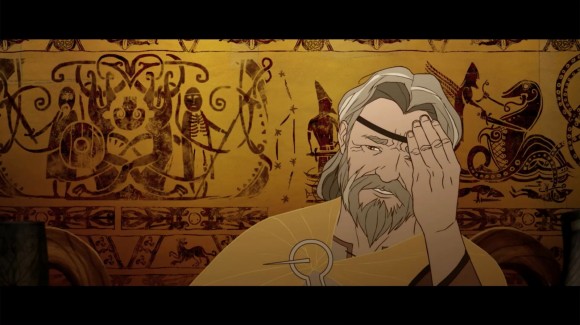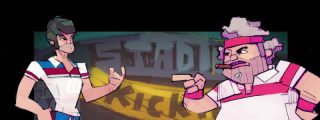What better to do whilst suffering through the Northeast’s polar vortex than curl up in a freezing pre-war apartment with a copy of a game where everything is covered in ice and snow? The Banner Saga is the first effort by studio Stoic, a developer that much like the traveling caravans in Banner Saga is full of refugees from a not so little company called BioWare. Like the heroes of their narrative, they took on a hefty task and underwhelmed in the performance.
At first glance the Banner Saga is going to be a treat, a tactical RPG with a story steeped in Norse mythology told through lively character portraits and lovely landscapes, a soundtrack orchestrated by Journey’s (the game, not the band) Austin Wintory, and a combat system that puts a zesty twist on turn based combat. It’s a great veneer that begins to crack once you work your way into the meat of the game. You find a story that for priding itself on the originality of pulling from Norse mythology (which let’s be honest now is ground that’s been covered by RPGs for a long time) tends to be incredibly one note in its delivery alongside fantasy faire that’s not much better than an airport novella.
While the soundtrack is consistently pleasing, Stoic doesn’t optimize its use and tracks seem to play similar to how they would on an itune’s shuffle list, they’re not underscoring the game or bringing emotion, they just kind of play whenever the game feels like it. The character artwork too is a simple looping of the same stilted portraits, and the landscapes often forced on you with long periods of travel that feel almost as if the background artist is pointing your head at their work and screaming LOOK AT MY ART, LOOK AT HOW BEAUTIFUL. Now, apparently the background at is inspired by American artist Eyvind Earle, and if you’re familiar with his paintings you can see the nod in Banner Saga’s portraits, but I shouldn’t have to be forced to take in the homage.
Before we get into the combat let’s discuss the Dredge. The large black golems that are a constant menace over the course of the game. There’s a lot of Dredge. Dredge are an issue. There’s a Dredge problem. Are you tired of me typing Dredge? Well you’ll likely get sick of it when you play the game as well. They serve as the faceless horde, the orcs in Lord of the Rings or the undead in Game of Thrones, or the orcs and undead in Warcraft. That overwhelming, unbeatable force that leaves a lot of corpses in their wake. You’re going to be spending all of the game running from them. All. Of. The. Game.
There’s only one problem with this, Dredge are more or less the only enemy you’ll ever face. Unlike the above cited works that kept their hordes somehow hidden behind closed doors, having them show up only when necessary to make a few dark age warriors soak their britches, Banner Saga has you fight this one enemy all the time. It makes them lose impact or any sense of meaning, they stop being terrifying and start being eye rolling. It’s to the point where I was thankful to see a battle with other humans or the race of giants known as varl. That’s right, Stoic managed to create a game where the most exciting enemy is Man.
The story directly clashing with mechanics is in fact a major fault in this game. One character comes to mind in particular, Alette, the daughter of the human lead Rook. She was painted as a frightened little dove who didn’t want to fight. This is all well and good save for the fact Alette was easily the strongest unit in my party, the line up of Dredge that had her shaking like jelly could easily be shiskabobbed by a single one of her arrows. In an age where story and mechanics are increasingly aware of one another (see several of the Game of the Year contenders on our site), in a genre where characters typically recognize they are in a WAR and need to FIGHT (see our strongest contender: Fire Emblem) it’s a lack of plot awareness that needed to have a second look.
The combat at first glance is very interesting. Each unit has two very important stats, Armor which dictates how much they can take and Strength which dictates how much they can dish. Strength is also linked to health, so when an enemy attacks your Strength that unit is not only getting physically weaker, but they’re also inching closer to death. Luckily the Armor rating can keep Strength from ticking down in drastic numbers. Now of course as you get deeper into the game you start to see more abilities that simultaneously attack Armor and Strength, and attacks that can ignore Armor and damage Strength directly, but tying damage done to health remaining is a new approach to the tactical RPG genre and one of Banner Saga’s more commendable features. At least initially. Finally there’s Willpower, for lack of a better parallel we’ll call it MP or Mana as it’s what allows you to utilize special attacks. Willpower also allows you to exert a character’s movement and damage.
The AI is fantastically easy to bait, and the computer is never likely to surprise you. Sadly there’s also a huge balancing issue in Banner Saga, to the point it feels like most parameters for a Game Over (more on that later) were removed in lieu of actually bothering to balance the game. The storyline is split for the most part between two perspectives, which also generates two different parties. Your mostly Varl party has a lot of Varl, and Varl are really good at killing Dredge. Your mostly human party has a lot of Archers, and Archers are also really good at killing Dredge.
Basically all my strategies began to revolve around letting the overpowered units do the heavy lifting (Archers and any Varl) with everyone else either providing a distraction or sitting in the wings and sipping mead. Dredge also get the same units as you, which is a problem because the game only seems to have a handful of classes, with subclasses dictating which “special move” that unit gets and ultimately making combat uninteresting and unsurprising. No matter what formations you take, no matter how many or how few Dredge you fought, every battle got to be a mirror of the last.
Which brings us to the most bizarre mechanic. The Oregon Trail esque feature that’s too prominent to simply be written off as a minigame. Between combat maps and towns you’ll be traveling (Read: Most likely running from Dredge), and you’re tasked with making decisions for the health of the caravan. Now the game says your decisions matter, but all this really seems to do is slide the numbers of folks you have in your caravan while occasionally netting you a new unit, there’s next to no story impact whatsoever. Now sometimes you may run into (surprise surprise) more Dredge and your caravan dictates how well you’ll do against them, but you’re given so many choices no matter your numbers that it’s inconsequential.
The morale of your caravan does directly translate to combat maps and how much extra Willpower you have at your disposal, but it’s painfully easy to make back Willpower in battle either via other special abilities or killing Dre….enemies. There is a bit of micromanagement in the form of Renown, which serves as both currency and experience, so you’ll probably be measuring whether you want to level up a character, buy new equipment or get supplies for your caravan. Gear seemed most important in my run, followed by leveling characters mostly to use said gear, with supplies in a distant third because I stopped giving two damns about my caravan.
Now, there is a measure of consequence in this game as advertised, but like everything else it’s handled rather poorly. The game has a story it wants to tell, no matter what, and so you’re stuck on a linear path. The consequences in question affect your units, they can potentially die or permanently leave your party. In Fire Emblem this was a pretty great mechanic because it forced you to handle your units with caution, there was a direct cause and effect. In Banner Saga it falls flat because the game is very sketchy on informing you when a choice might remove a character for good and when they’ll be fine. One example is the varl Krumr, who I let leave my caravan to fight a battle on his own and he came back fine, the second time I let him do a little hunting he died. It more or less boiled down to the same exact choice, but one decision decided to kill him for good and the other didn’t.
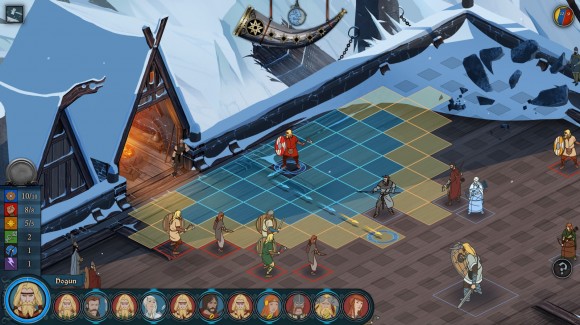
My buddy Hogun was susceptible to a lot of Plot Death as well I found out, I somehow kept him alive… Though I never knew which decisions I made to do so.
There was another instance when a traitor to my caravan drastically cleaved my party, with no indication he would do so other than warnings so vague they may as well not be warnings. A character I talked to about the event later in the game asked me “What’d you want me to say? Watch out, he’s going to murder your whole family!” And the answer is; Yes, that’s exactly what I would have liked. This is a video GAME, the parameters for failure and success are supposed to be made clear to the player otherwise what you’re doing is called ‘cheating’. The tactics pulled in Banner Saga are game design that disappeared in the 16bit and 32bit era because it’s just flat out not good design. I’m up for a challenge, the Fire Emblems and XCOMs of the world, I’m not up for being cheated.
But in terms of any other actual consequence? Not a whole lot, because the game is intent to jerk you around in whichever direction it wants to go. In fact, on at least one map I full on wiped, all characters dead. The game kept going. Sure the fallen characters suffered an injury penalty that temporarily nerfed their Strength, but in terms of any real cause and effect there was none. I can’t lose the game, and the game was going to chug along on its awfully linear story regardless of what I did. It’s one of the worst cases of illusion of choice I’ve seen in a game.
As far as the core gameplay is concerned it feels as though the game needed more time to incubate, the Oregon Trail mechanic is out of place and the micromanagement of Renown is unnecessary. The story is absolutely helpless at this point, as it meanders about much like the traveling caravan, “running away from X” especially a big bad that you’ve proven to be not so big and bad is not compelling in the least. If you want to be wowed by some pretty artwork and a good soundtrack for a few minutes before being sucked into boredom, then I strongly advise this title. There are far better games worth your time, especially in the tactical RPG genre, and I just hope Stoic can get it together for a future release.


